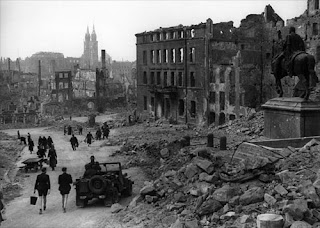This was where captured Nazis were tried over a period of 4 years for their various crimes.
Before now, I took it as a kind of granted that yeah, when people do terrible things (like epic torture and genocide), they face the consequences and go to trial.
But what I never quite wrapped my head around was the magnitude of these trials and how challenging it was to format them, as they were the first of their kind. The trials following WWI had been unsuccessful and many feared these would go the same way.
Can you imagine having a bunch of Nazis in custody, knowing the world is watching you and praying for revenge, and trying to figure out how to stage such a huge undertaking? And make sure that it is carried out with true justice, and not just fall victim to spite and malevolence..? Damn tricky.
The Allied world was so frustrated at not being able to take Hitler himself to trial that emotions were running high and the remaining war criminals were the victim of overwhelming loathing, to the point that they had to be highly selective in choosing soldiers to guard the inmates, for fear of having them personally assassinated before they were taken to trial.
The Allied world was so frustrated at not being able to take Hitler himself to trial that emotions were running high and the remaining war criminals were the victim of overwhelming loathing, to the point that they had to be highly selective in choosing soldiers to guard the inmates, for fear of having them personally assassinated before they were taken to trial.
 |
| Nuremberg Palace of Justice |
These weren't just trials for crimes, but a juncture where the humanity of civilization and value of human worth, particularly during wartime, came into question. How to define such existential things? What a nightmare.
"What makes this inquest significant is that these prisoners represent sinister influences that will lurk in the world long after their bodies have returned to dust. We will show them to be living symbols of racial hatreds, of terrorism and violence, and of the arrogance and cruelty of power."
-Robert Jackson, Chief Prosecuter
-Robert Jackson, Chief Prosecuter
CHOOSING A VENUE
It was decided that the trials should take place in Germany, but by 1945 there weren't many German cities left with a courthouse still standing.
Nuremberg was 90% destroyed, but the courthouse and a luxurious hotel nearby were still in good shape, and it was considered fitting that the trials should be held in Nuremberg, where Hitler held elaborate rallies and the Nazis expounded their initial "Nuremberg Laws" that stripped Jews of their basic rights.
Nuremberg was 90% destroyed, but the courthouse and a luxurious hotel nearby were still in good shape, and it was considered fitting that the trials should be held in Nuremberg, where Hitler held elaborate rallies and the Nazis expounded their initial "Nuremberg Laws" that stripped Jews of their basic rights.
The key Allied powers (England, France, USSR, America) each sent delegates to Nuremberg to devise how the trials would go. After extensive discussion, the International Military Tribunal was formed as the trying court and was made of a primary and alternate judge from each country.
The topic of intense debate, it was finally decided that the justice system to be used was that favored by the Americans and the British.
Then it was time to gather the evidence. Although millions of incriminating documents were destroyed near the end of the war, fortunately, thousands were saved that provided context to the Nazi mission. The prosecution went over 100,000 different documents for the Nuremberg Trials and used these to form different indictments, including:
- CONSPIRACY TO WAGE AGGRESSIVE WAR
- WAGING AGGRESSIVE WAR (also known as CRIMES AGAINST PEACE)
- WAR CRIMES
Traditional violations, such as killing/mistreatment of prisoners and using outlawed weapons.
- CRIMES AGAINST HUMANITY
Crimes committed against Jews, ethnic minorities, homosexuals, physically disabled and mentally
ill, etc.
ill, etc.
It took an entire day in court for the prosecution to read the list of crimes the main defendants (there were hundreds taken to trial in Nuremberg, but the main focus was on 21 of the Nazi ringleaders).
The defendants were seated inside a panel of bulletproof glass.
Whew. I must stop now. This is quite a disturbing a fatiguing subject and I can only handle it in small spurts. So now it is back to sorting through old clothes and closet cleaning. Yuck.
I will write more soon!



No comments:
Post a Comment